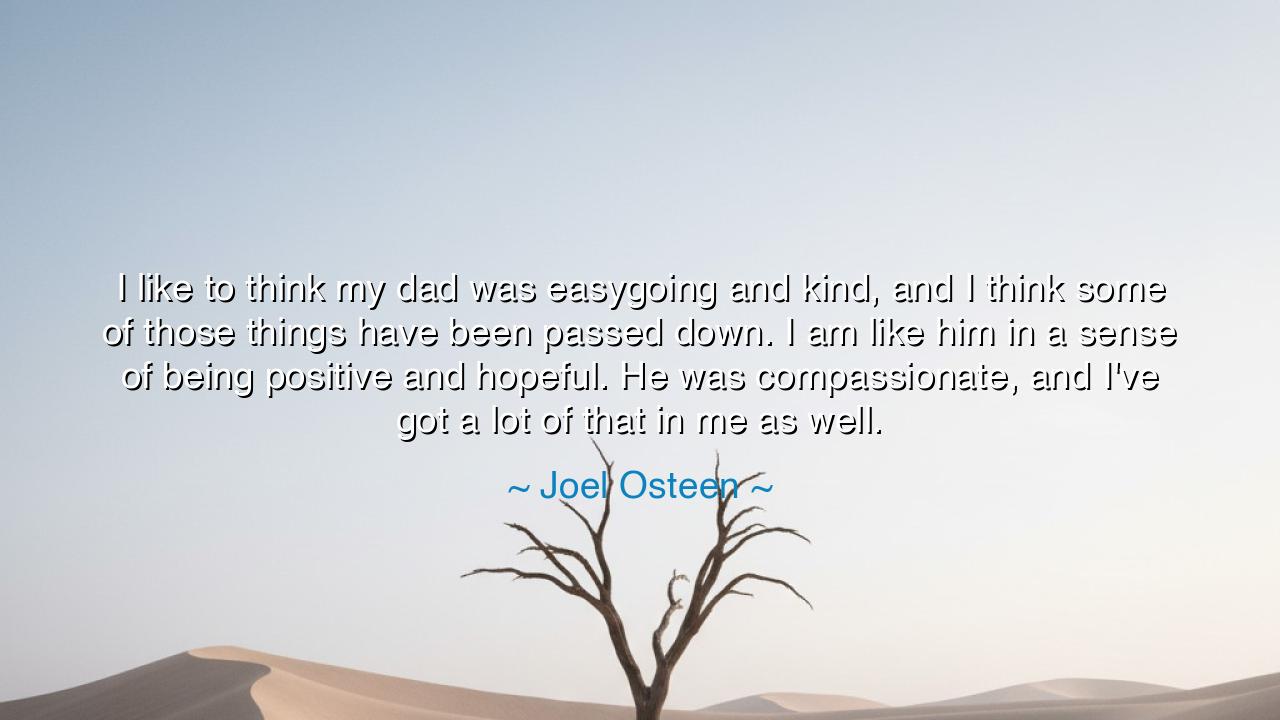
I like to think my dad was easygoing and kind, and I think some
I like to think my dad was easygoing and kind, and I think some of those things have been passed down. I am like him in a sense of being positive and hopeful. He was compassionate, and I've got a lot of that in me as well.






In a voice both tender and timeless, Joel Osteen once reflected: “I like to think my dad was easygoing and kind, and I think some of those things have been passed down. I am like him in a sense of being positive and hopeful. He was compassionate, and I’ve got a lot of that in me as well.” These words, gentle in tone yet vast in meaning, carry the essence of inheritance—not of wealth or position, but of character. For what Joel speaks of is the sacred bond between generations, the way virtue flows like a river from father to child, shaping not the features of the face, but the architecture of the soul.
To the ancients, this truth would have been a sacred law: that goodness, once born in one heart, may live forever through those it touches. A father’s kindness is not lost when he departs this world; it becomes the quiet rhythm that guides his children’s steps. Joel’s father, John Osteen, was a pastor, a man of faith and compassion who built not merely a church, but a legacy of love and encouragement. When Joel speaks of his father’s spirit within him, he is speaking of this continuity of grace—the way one life plants seeds of virtue that bloom long after the sower is gone.
“I am like him,” Joel says—not to boast, but to give thanks. For to resemble a good man is among the highest honors. The ancients taught that we do not choose our blood, but we can choose to honor it. The son who carries forward the gentleness of his father, or the daughter who continues her mother’s courage, becomes the living proof that goodness never dies. In this way, lineage becomes more than ancestry—it becomes purpose. Joel’s words remind us that every act of kindness, every moment of compassion, is an inheritance waiting to be passed on.
Such inheritance has echoed through history. Consider Marcus Aurelius, the philosopher-king of Rome, who in his Meditations wrote lovingly of his adoptive father Antoninus Pius: “From him I learned mildness of temper and unchangeable adherence to deliberate decisions.” The wisdom and calm of Antoninus became the moral foundation upon which Marcus ruled an empire. So too, in Joel’s remembrance of his father, we see the same principle—the transmission of virtue. What Antoninus gave to Rome through Marcus, John Osteen gave to the world through his son: a message of steadfast positivity, of faith that never yields to despair.
But there is more beneath Joel’s reflection than simple memory. When he speaks of being positive and hopeful, he acknowledges that such qualities are not mere personality—they are spiritual disciplines. To remain hopeful when others surrender to fear, to be compassionate when the world grows cold, is a strength passed through love and example. His father’s life was his first sermon; his gentleness, the first parable Joel ever learned. And so, by choosing to live as his father did, Joel becomes not an imitator, but a continuation—the next verse in a song of faith.
This, then, is the deeper message of the quote: that the virtues of those who came before us are both a gift and a duty. If we have inherited compassion, we must use it to heal. If we have inherited hope, we must give it to others. And if we have inherited kindness, we must multiply it. In this way, the good that our parents or mentors embodied does not fade—it multiplies through us, shaping the future just as it once shaped us.
So let this teaching be remembered by all who walk the earth: we are the echo of those who loved us well. Their faith becomes our strength; their kindness, our calling. Think of those whose lives touched yours—your parents, teachers, mentors—and ask what part of them still lives in you. Then live in such a way that the next generation may one day say of you, as Joel said of his father, “I have a lot of that in me as well.” For this is the highest form of immortality—not to be remembered for what we achieved, but for the goodness we passed on.
And so, as the ancients would proclaim, let the chain of virtue never be broken. Let kindness beget kindness, hope give birth to hope, and compassion live forever through the lives it inspires. For in this sacred continuity, the spirit of humanity endures—and the love of one father can echo across centuries.






AAdministratorAdministrator
Welcome, honored guests. Please leave a comment, we will respond soon